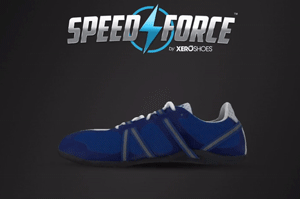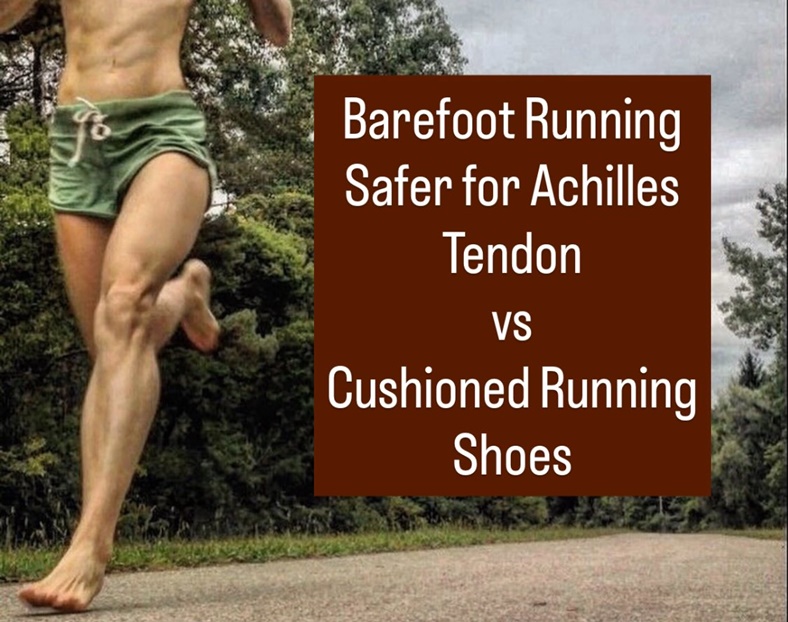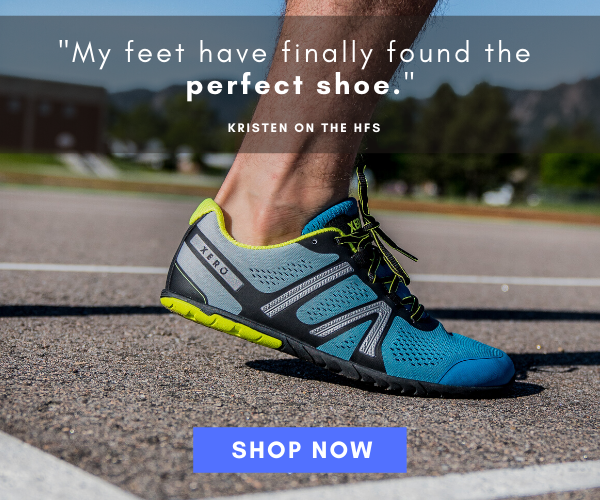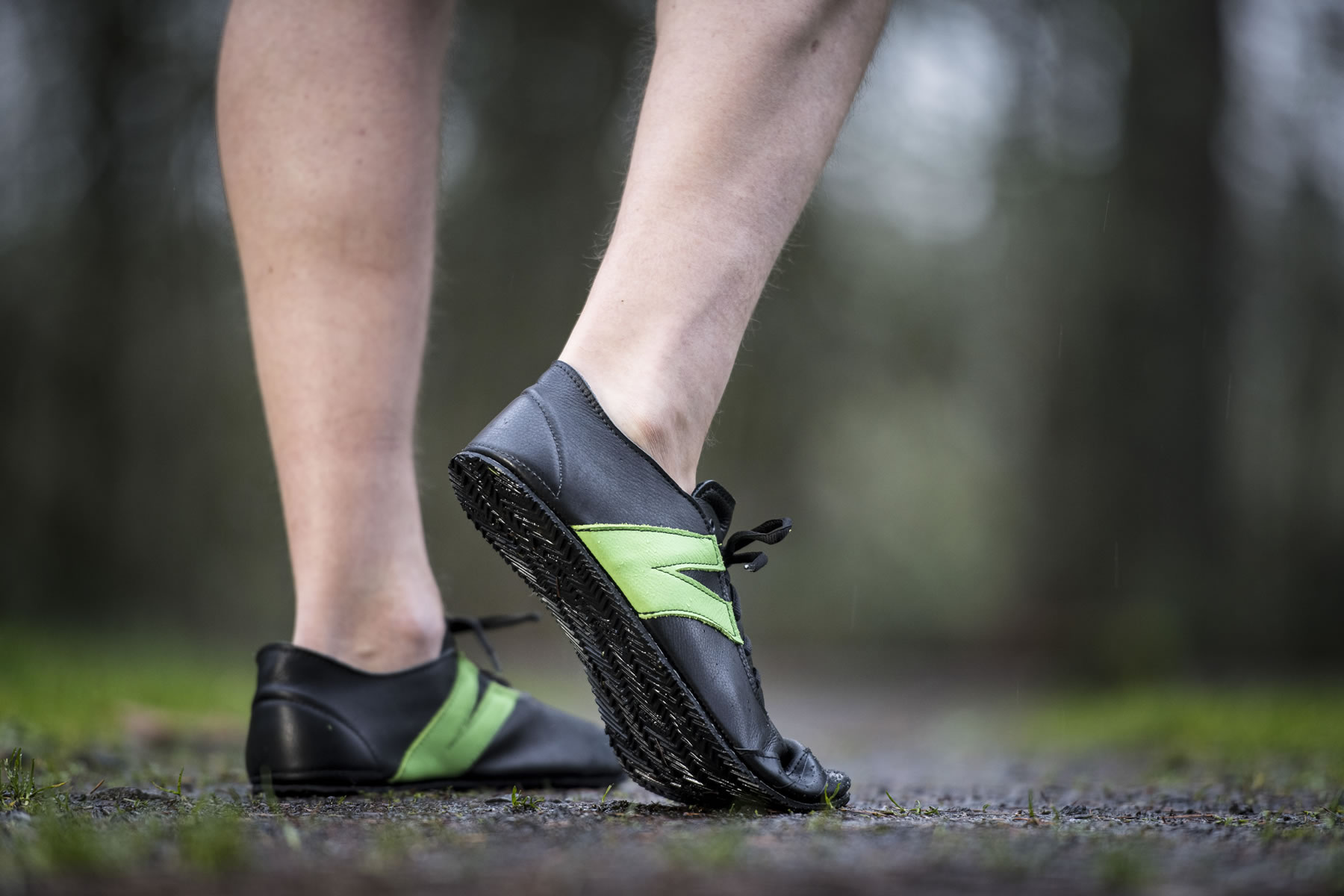Just because a running shoe is thickly cushioned doesn’t mean its better for injury prevention. Concerningly, the evidence is becoming more compelling that cushioned running shoes, namely those with more cushioning under the heel than the front of the shoe puts unusual mechanical strain on the Achilles tendon vs flatter running shoes and running barefoot.

Research (references below article) show that cushioned running shoes with an elevated wedged heel exaggerated forefoot eversion (foot tilted too far outward) at landing, which transferred high tibial (shin) rotational forces and a wringing-like action to the Achilles.
Additionally, similar findings by Donoghue et al. in the journal, Res Sports Med, compared lower leg kinematics during barefoot and shod (shoe) running in runners with a long history of Achilles injury to healthy runners, and concluded the following:
- Runners with Achilles injury had greater forefoot eversion during stance, which was exaggerated in thick cushioned running shoes.
- Thick cushioned running shoes consistently exaggerated the maximum and range of motion values associated with Achilles injury.
- Shod runners had the largest measure of forefoot eversion (10.52°) than the barefoot runners (8.21°).

These findings mean thick cushioned running shoes cause foot motions to exceed a healthy range of tolerance with each step, leading to misalignments of the foot, ankle and shin at landing, which in turn, increases rotational stress and bending strain on the Achilles vs barefoot running.

The reason running barefoot was safer on the Achilles was due to the lack of mechanical interference from thick heel cushioning. Its the absence of cushioning, especially under the heel, that allows for more a stable and direct connection with the ground.
Specifically, running barefoot naturally increases step-stability, thereby restricting bending and twisting strain on the Achilles through encouraging, not a heel strike, but a forefoot strike which provides a larger contact area of the foot with the ground. At the same time, running barefoot also engages a higher step-rate (i.e. the foot spends less time grappling on the ground, and more time in the air), which further limits the time for extreme movements of the foot and Achilles to occur.

Conversely, running shoes with thick padded heels often facilitate a heel strike which causes the body to balance on a smaller contact-point of the foot at landing. This is why landing high up on the heel was found to create an unstable support surface that caused injurious whipping motions on the Achilles. Read more here on that!
Its for all these reasons that minimalist shoes which are shoes with flatter heels, as well as running barefoot, are still gaining momentum in popularity as a necessary imperative to injury prevention simply by naturally improving the stability in movements of the the foot and the Achilles at landing, whereas running shoes with considerably thick heels gives you less stability control by causing more rigid landings via engaging a heel strike tied to more displacements in foot and ankle posture.
On that note, here are all the other problems linked to thick cushioned heeled running shoes, which are corrected by running barefoot or in minimalist shoes.
References:
Clement DB, Taunton JE, Smart GW (1984) Achilles tendonitis and peritendinitis: Etiology and treatment. American Journal of Sports Medicine 12(3): 179–184.
Donoghue et al. Lower limb kinematics of subjects with chronic achilles tendon injury during running. Res Sports Med, 2008;16:23-38.
Hamill J, Haddad JM, van Emmerik REA (2006). Overuse injuries in running: Do complex analyses help our understanding? In H. Schwameder, G. Strutzenberger,V.Fastenbauer, et al. (Eds.) XXIV International Symposium on Biomechanics in Sports (pp. 27–32). Salzburg, Austria: International Society of Biomechanics in Sports.
If you’d like, you can support Run Forefoot and help keep it going by making a donation in any amount of your choosing:
Or, you can support Run Forefoot by shopping at the BEST Barefoot Shoe Brands, and be sure to bookmark these links 🙂
Lonowear: https://lonowear.com/?ref=cedsholh
Saguaro: https://www.saguaro.com/?ref=9bVA8fEkmDvB-I
Vibram FiveFingers: https://amzn.to/3VQLAUI
Vivobarefoot: https://amzn.to/3vycQOY
Be Lenka: https://www.tkqlhce.com/click-7600968-13947200
Xero Shoes: https://xeroshoes.com/go/Run_Forefoot
Iguaneye: https://www.iguaneye.com/?ref=8tfXVc92
Soft Star Shoes: https://shrsl.com/3mp1b
Wilding Shoes: https://bit.ly/3lIygQP




Your point of view caught my eye and was very interesting. Thanks. I have a question for you.
Can you be more specific about the content of your article? After reading it, I still have some doubts. Hope you can help me. https://www.binance.com/hu/register?ref=FIHEGIZ8
Thanks for sharing. I read many of your blog posts, cool, your blog is very good. https://www.binance.com/en-IN/register?ref=UM6SMJM3
I don’t think the title of your article matches the content lol. Just kidding, mainly because I had some doubts after reading the article.
Can you be more specific about the content of your article? After reading it, I still have some doubts. Hope you can help me. https://accounts.binance.com/pl/register-person?ref=YY80CKRN
Thank you for your sharing. I am worried that I lack creative ideas. It is your article that makes me full of hope. Thank you. But, I have a question, can you help me?
Your article helped me a lot, is there any more related content? Thanks!
I don’t think the title of your article matches the content lol. Just kidding, mainly because I had some doubts after reading the article.